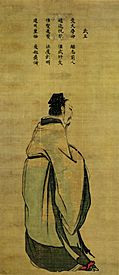King Wu of Zhou facts for kids
Quick facts for kids King Wu of Zhou周武王 |
|||||
|---|---|---|---|---|---|

King Wu painted by Ma Lin
|
|||||
| King of China | |||||
| Reign | 1046–1043 BC | ||||
| Predecessor | King Zhou of Shang | ||||
| Successor | King Cheng of Zhou | ||||
| Died | 1043 BC Haojing |
||||
| Spouse | Yi Jiang | ||||
| Issue | King Cheng of Zhou Yu, Marquis of Tang Da Ji Lan |
||||
|
|||||
| House | Zhou dynasty | ||||
| Father | King Wen of Zhou | ||||
| Mother | Tai Si | ||||
| King Wu of Zhou | |||||||||||||||||||||||||
|---|---|---|---|---|---|---|---|---|---|---|---|---|---|---|---|---|---|---|---|---|---|---|---|---|---|
| Chinese | 周武王 | ||||||||||||||||||||||||
| Literal meaning | "The Martial King of Zhou" | ||||||||||||||||||||||||
|
|||||||||||||||||||||||||
| Alternative Chinese name | |||||||||||||||||||||||||
| Traditional Chinese | 姬發 | ||||||||||||||||||||||||
| Simplified Chinese | 姬发 | ||||||||||||||||||||||||
| Literal meaning | (personal name) | ||||||||||||||||||||||||
|
|||||||||||||||||||||||||
King Wu of Zhou (Chinese: 周武王; pinyin: Zhōu Wǔ Wáng) was the very first king of the Zhou dynasty in ancient China. He is famous for leading his people to victory against the powerful Shang dynasty. His rule is believed to have started around 1046 BC and lasted for about three years, ending in 1043 BC.
King Wu's family name was Ji, and his personal name was Fa. He was the second son of King Wen of Zhou and Queen Taisi. Many stories say that his older brother, Bo Yikao, died before their father. This often happened because of King Zhou, the last ruler of the Shang dynasty. However, some old texts suggest that the Zhou people sometimes chose a younger son to inherit the throne.
Contents
King Wu: The First King of the Zhou Dynasty
How King Wu Became a Leader
After his father passed away, Fa became the new leader. He worked closely with his father-in-law, Jiang Ziya, who was a wise advisor. Together, they planned to finish what King Wen had started: overthrowing the Shang dynasty. The Shang rulers had become very cruel, and many people wanted a change.
Overthrowing the Shang Dynasty
In 1048 BC, King Wu led his army down the Yellow River. He met with over 800 local leaders at a place called Mengjin. He carried a special tablet with his father's name, King Wen, on a chariot. This showed respect for his father's vision. At first, he decided not to attack, thinking the time wasn't right.
But in 1046 BC, King Wu saw his chance. The Shang dynasty was having problems from within. He launched a big attack with many allied leaders. This led to the famous Battle of Muye. King Wu's forces won a great victory, completely defeating the Shang army. The last Shang king, King Zhou, set his palace on fire and died inside.
King Wu's Rule and Legacy
King Wu's name means "Martial King," which fits his military success. After his victory, he set up many small feudal states across the land. He gave control of these states to his 16 younger brothers and other relatives who were allied by marriage. This helped him manage the large new kingdom.
Sadly, King Wu died just three years after his great victory. His son, King Cheng of Zhou, was very young. The Duke of Zhou, King Wu's brother, became the regent to help rule. However, King Wu's death caused some rebellions, even from three of his own brothers.
King Wu is remembered as one of China's greatest heroes. People often compare him to legendary figures like the Yellow Emperor and Yu the Great.
Where is King Wu Buried?
For a long time, people thought a burial mound in Zhouling town, Shaanxi, was King Wu's tomb. A headstone was even placed there during the Qing dynasty with his name on it. However, modern archaeologists have studied the tomb. They found that it is not old enough to be from the Zhou dynasty. It's more likely the tomb of a royal from the later Han dynasty. The real location of King Wu's tomb is still a mystery. It is probably somewhere in the Xianyang-Xi'an area.
Family Life of King Wu
King Wu had a family that helped shape the early Zhou dynasty.
King Wu's Wives and Children
His main wife was Yi Jiang. She was the daughter of the Great Duke of Qi, Jiang Ziya, who was also King Wu's wise advisor. Yi Jiang was the mother of his first son, Song, and another son named Yu.
King Wu had several sons:
- Prince Song (born around 1060 BC), who later became King Cheng of Zhou. He ruled from 1042 to 1021 BC.
- Another son who became the ruler of Yu.
- Prince Yu, who became the Marquis of Tang.
- A son who ruled as the Marquis of Ying.
- A son who ruled as the Marquis of Han.
He also had daughters:
- His first daughter, Da Ji. She married Duke Hu of Chen.
- His youngest daughter, Lan. She married Duke Yǐ of Qi.
See also
 In Spanish: Rey Wu de Zhou para niños
In Spanish: Rey Wu de Zhou para niños
 | William L. Dawson |
 | W. E. B. Du Bois |
 | Harry Belafonte |

